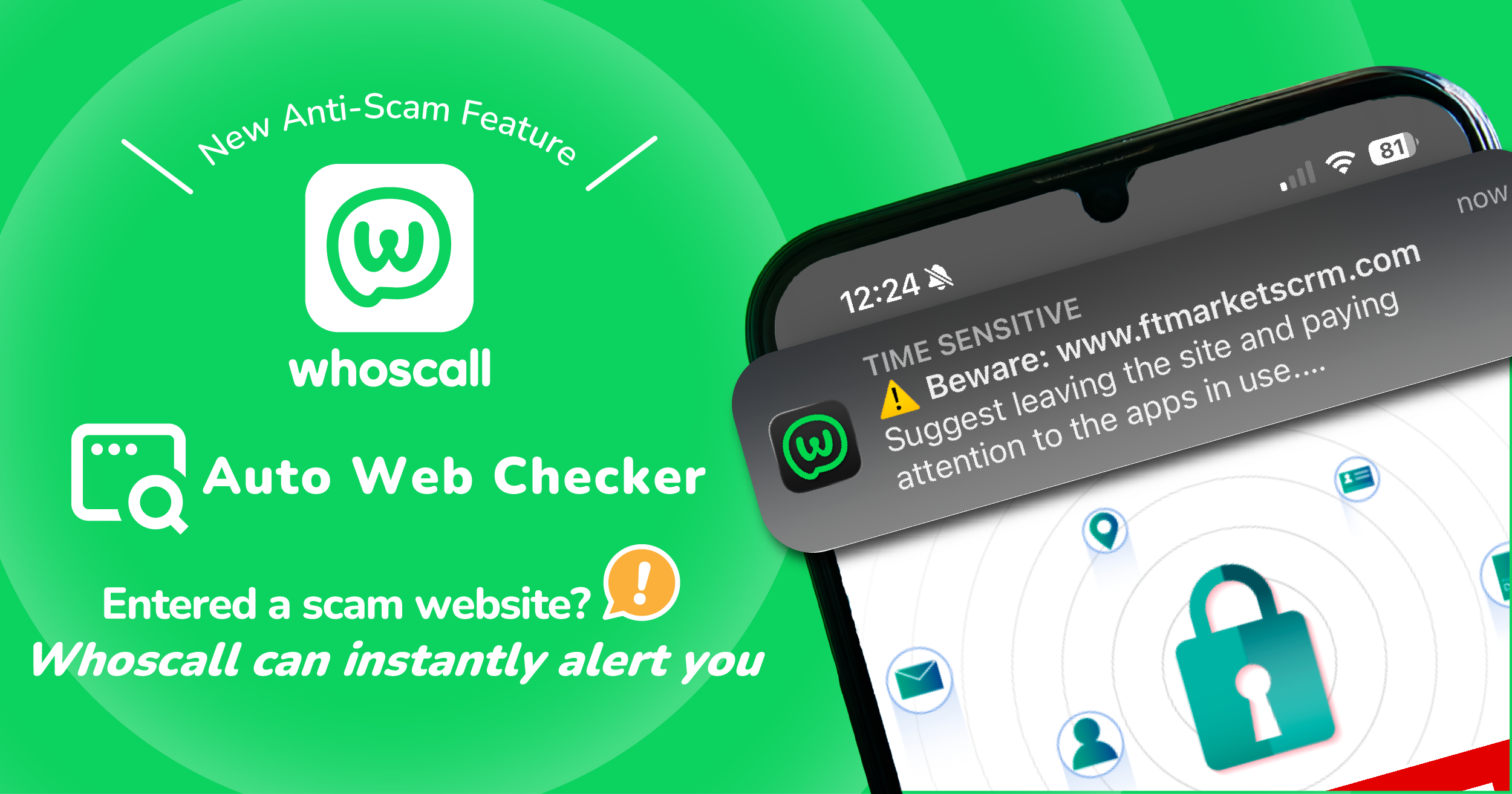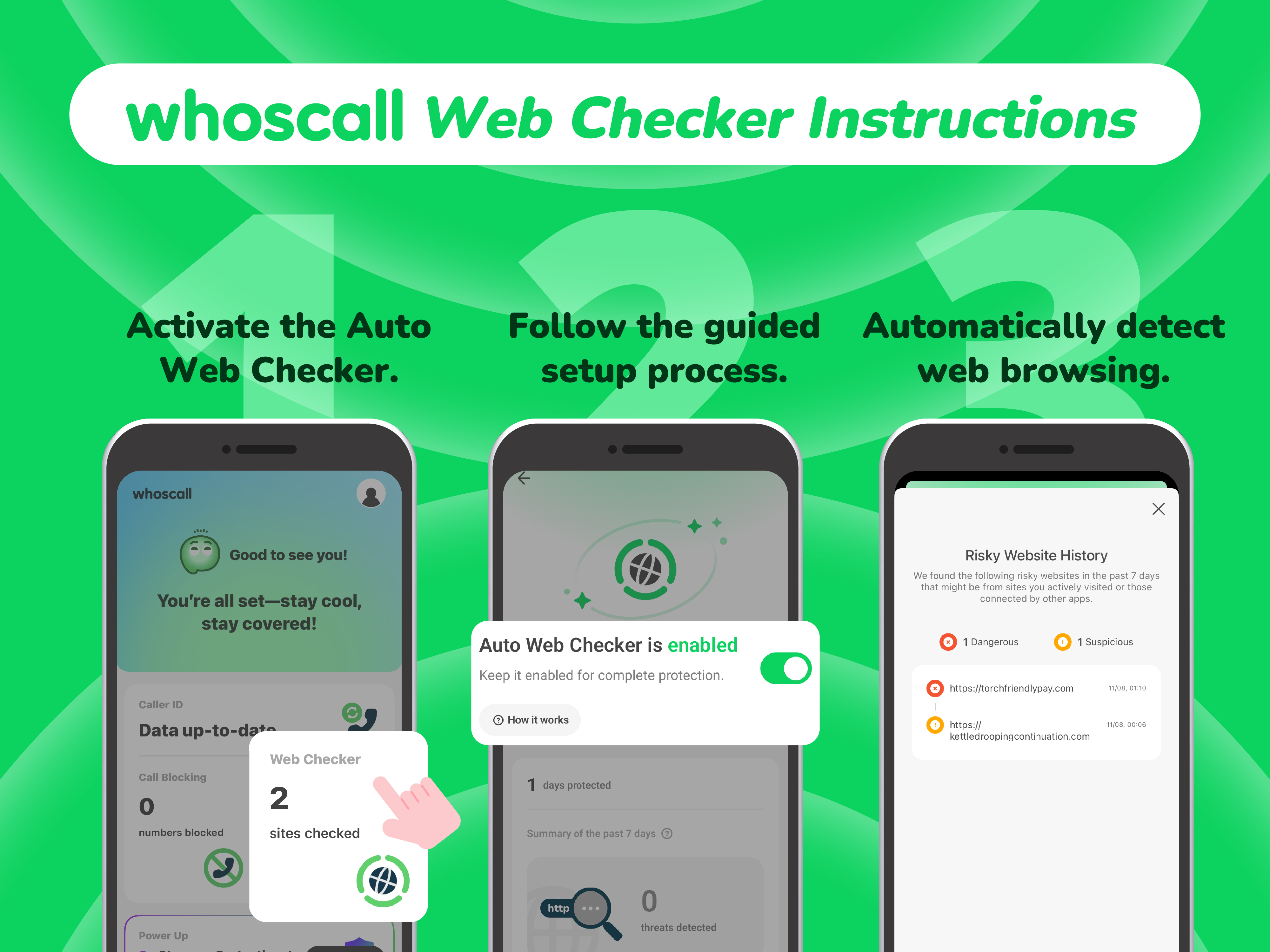
Say Goodbye to Worries About Scam Links! Whoscall's new "Automatic Web Checker" feature is here to enhance your online safety. With just one click, you'll receive instant alerts if you accidentally visit a scam website or encounter a malicious URL. This powerful tool ensures that your online experience is secure and worry-free. In this article, we'll walk you through how Whoscall's Web Checker works and how it can protect you from online scam.
Countless Scam Websites Await—One Wrong Click Could Trap You
As internet usage has surged, scammers have increasingly moved their operations from phone calls to scam websites, often using mixed tactics to target unsuspecting users. These malicious actors employ a variety of strategies to strike at any moment. Have you ever faced any of these scenarios?1. Phishing Websites
Phishing websites are increasingly common, and just entering your information can lead to serious account theft. For example, many Instagram accounts have been compromised by scammers who send phishing messages to contacts, pretending to be a friend and chatting. Their aim is to direct you to a phishing site where entering your phone number, password, and OTP code can result in immediate account theft. Additionally, scammers often use stolen credentials to attempt unauthorized access to your other social media platforms, including WhatsApp, Facebook, Threads, and more.
2. Online Shopping Scams
While online shopping offers convenience, it also presents significant risks. Scammers often create fake websites that mimic well-known brands. For instance, when searching for "Nike" on Google, you may encounter several convincing but fraudulent sites, such as:
hxxps[:]//www[.]nike-store.top/
hxxps[:]//www[.]nike-trademark.com/

These deceptive websites often look legitimate at first, making it easy to accidentally place an order on a counterfeit site. Always verify the authenticity of the website before making a purchase to avoid falling victim to shopping scams. The official Nike website is https://www.nike.com/.
Additionally, some online shopping scams involve websites that promote limited-time deals. These sites may not impersonate well-known brands but lure shoppers with unusually low prices. To further deceive you, they often offer cash on delivery, making the deal seem safer. It’s only after you receive and open the package that you realize the contents are vastly different from what was advertised, exposing the scam.
3. Fake Investment Platforms
The internet is rife with ads and newsletters promoting schemes like "Promised Profits," and "Low Risk, High Reward." Individuals seeking additional passive income often fall victim to these fraudulent platforms, where investments can range from thousands to tens of thousands of dollars. Once trapped, it’s difficult to recover your funds.
Recently, many investment scams have been combined with relationship and job search scams, making them even more convincing. For instance, scammers may use dating apps to build trust with individuals seeking a soulmate. After establishing a relationship, they may suggest investing together on a fraudulent platform under the guise of a joint financial goal. Similarly, some scams use job recruitment offers to introduce investment opportunities, falsely claiming they are part of the job benefits.
The phishing sites, shopping scams, and fake investment platforms listed above are just the tip of the iceberg. Scamming websites come in many forms and use various methods to appear convincing. Many of these are difficult to identify with the naked eye and can pop up at any time. When these websites and links come into view, even if something feels off, how can you be sure whether they are scams or valuable opportunities you shouldn’t miss? Is relying on intuition the only option?
Whoscall "Auto Web Checker" Provides Instant Scam Alerts for Safer Browsing
Whoscall has launched a new anti-scam feature called "Auto Web Checker" designed to detect and alert users about phishing websites in real-time. "Auto Web Checker" provides real-time protection, covering websites visited through browsers and other apps, such as fake e-commerce ads or malicious apps connecting to high-risk websites. If there is a scam risk, Whoscall will automatically issue a warning—no more relying on intuition to identify scams!
Whoscall's anti-scam website database combines AI detection with user reports and data from partners like the Criminal Investigation Bureau, and ScamAdviser, forming one of the world's most comprehensive databases, containing data on tens of millions of websites. Importantly, Whoscall only assesses website risk during use and does not record any browsing content or personal data, ensuring your privacy remains intact.
How to Active Whoscall Auto Web Checker
First, Install and Update Whoscall App
Whoscall's recently launched "Auto Web Checker" is now available. Ensure your Whoscall app is updated to the latest version to take advantage of this service. If you haven't installed Whoscall yet, you can click here to install it.
⚠️ Note: The "Auto Web Checker" feature is supported only on iOS 16 / Android 9 and above. Please check your phone's system version before updating.

Step 1: Go to "Web Checker"
iOS users: Open the Whoscall app and select the "Web Checker" feature from the main page.
Android users: Open the Whoscall app, navigate to the side menu, and choose "Web Checker."
Step 2: Activate the Auto Web Checker
In the interface, you'll find a section where you can directly enter a website URL for a manual URL check. Additionally, at the bottom right of the screen, there's an option labeled "Auto Web Checker." Click on "Enable now" to activate this feature.
Step 3: Automatic Web Browsing Detection
Once you've completed the setup, "Auto Web Checker" will start running. Whether you accidentally visit a scam website or your mobile app interacts with a dangerous site, you will receive an immediate alert. If a warning pops up while browsing, it is recommended to promptly close the website.
Want to Browse Safely Without Fear of Scams?
Enable Whoscall's "Automatic Web Checker" NOW! We'll help you detect potential dangers while you browse.
No need to rely on intuition alone for identifying scams anymore—now there's a more professional and simpler option.
👉 Click to use the 2024 top anti-scam app for free!
—------------------------------------------------------------------------------------------------------------------------
Let Whoscall be your ally. Install Whoscall to block nuisance calls and enhance personal security:
☑️ Caller ID: The first line of defense against phone scams! Know the caller's identity before deciding to answer, and easily avoid falling for the tricks of scammers.
☑️ ID Security: Stay informed about the safety of your personal information, and receive early warnings and reinforced defenses before scams strike!
☑️SMS Assistant: After upgrading to Whoscall Premium, Whoscall automatically categorizes your messages, filtering out high-risk texts for your peace of mind!
☑️Web Checker: With a single click, easily determine the safety of unknown links in text messages, searches, or group chats. Receive risk assessments for worry-free browsing.

